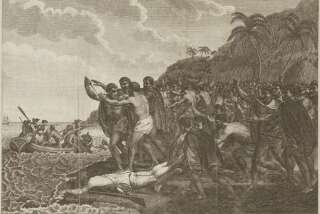There’s adventure ahead, so get the film crew in place
- Share via
There is a grand sameness to the sailing adventure story, just as with the mystery novel or proper tales of love. You more or less know where you’re headed before you crack the cover. You have expectations for such books.
The sailing adventure quite naturally begins with a leap of faith -- and then a struggle to maintain faith for what is a patently preposterous idea: a terrestrial creature stepping off from all that is solid underfoot and submitting to nature for flighty reasons that only dreamers can appreciate.
We allow the writer a fudge in this process. It would be unseemly to set to sea for the purpose of writing a book about setting to sea. So we accept that the writer has a more noble goal, something on the order of going to sea in order to see. The journey thus justifies the book, not the other way around.
Meanwhile, there are logistics. A sailboat is seldom ready to sail. It must be made so, work that is exactingly ritualized. None of this is new to the reader of sailing stories. If you have read 50 such books, you have gone though the exercise of refitting and packing up stores pretty well close to 50 times over. You instinctively know the emotions of finally pushing off the dock, mindful of foreboding weather.
The vast ocean becomes a mirror in which the sailor looks himself in the eye.
For just more than half of his short book “Seamanship: A Voyage Along the Wild Coasts of the British Isles,” Adam Nicolson follows the grand arc of the seafaring story with easy felicity. His journey is rather modest -- a start-and-stop trip from England to the northern Faeroe Islands halfway to Iceland, via coastal Ireland and Scotland. His daring is likewise restrained. He hires an acquaintance who is a sailing pro to captain the Colin Archer-designed wooden vessel purchased for the adventure.
But those are only honest details. To borrow a sailing term, Nicolson at sea is a writer with fair lines. In his company, one quickly departs the moorings of the armchair for open horizons, salt air, unsteady barometers and queasy stomachs. “The knowledge that is gathered in a boat is a great human inheritance, especially valuable because it is not material but intangible, a legacy made only of understanding,” he writes. He could just as well be describ- ing the legacy of seafaring literature.
Nicolson’s story runs into the doldrums on account of a surly war of wills and an overwrought falling-out with his captain. That is an unfortunate turn, but what is unpardonable is the appearance of a film crew, first lurking in the background and suddenly overshadowing the story. Not only has Nicolson a book in mind, he’s sailing a made-for-television journey.
The spell is broken.
His voyage of nearly a year reveals itself a little too clearly to be a series of short hops. The lyricism of the sea grows diluted by a skimpy travelogue of the northern British Isles.
Before his well-regarded account of the writing of the King James Bible, “God’s Secretaries,” Nicolson was a travel writer. But the work in “Seamanship” begins to bear less the heart of an inquiring wanderer than a man answering the nagging imperatives of a producer.
Nicolson dribbles out his ending with the self-consciousness of a blogger, abandoning his boat and the final passage home to answer “the other pressures of filmmaking.”
This we didn’t expect. This isn’t why we signed on. It is one thing to go to sea with a writer as good as this one; quite another -- and a much lesser thing -- to find ourselves passengers following a script that is part of a package deal. We thought Nicolson cast off for the horizon to see, but it turns out his aim was to make himself seen.
*
John Balzar is a sailor and the author of “Yukon Alone: The World’s Toughest Adventure Race.”
More to Read
Sign up for our Book Club newsletter
Get the latest news, events and more from the Los Angeles Times Book Club, and help us get L.A. reading and talking.
You may occasionally receive promotional content from the Los Angeles Times.







